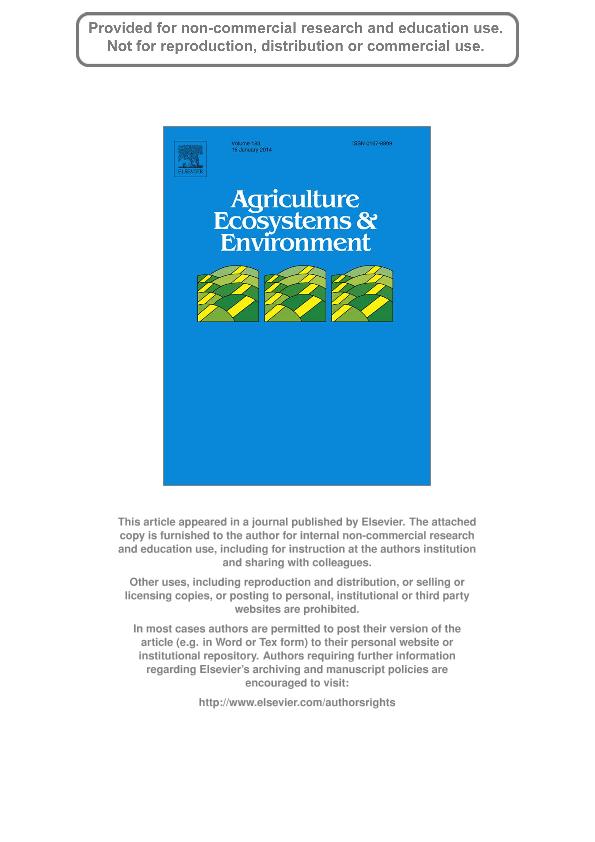Artículo
Uncropped field margins to mitigate soil carbon losses in agricultural landscapes
Fecha de publicación:
15/01/2014
Editorial:
Elsevier
Revista:
Agriculture, Ecosystems and Environment
ISSN:
0167-8809
Idioma:
Inglés
Tipo de recurso:
Artículo publicado
Clasificación temática:
Resumen
Agricultural intensification is a major cause of habitat transformation. Continuous cropping alters ecosystem services, such as biodiversity and carbon sequestration. Empirical evidence from agricultural lands in Argentina has shown that permanently vegetated areas imbedded in the agricultural matrix (uncropped margins) play a critical role in plant and animal communities compared to the usual situation of crops surrounded by other crops (cultivated margins). However, the potential impact of uncropped margins on their own carbon stocks and fluxes and on those of their neighbouring cropped fields remains unknown. We investigated the impact of uncropped (herbaceous and woody) and cropped margins (cultivated fields) on their own topsoil carbon stocks and fluxes and on those of their neighbouring croplands (soybean fields). We identified soybean fields adjacent to one of three possible margin types: herbaceous or woody permanent vegetation, and field crop, which acted as control because it is the most frequent situation in the region. In each of these margin?soybean pairs, we sampled transects from the margin towards the centre of the soybean field (50 m). Woody margins showed the greatest soil carbon content, the least decomposable plant litter and the greatest influence on the neighbouring crop. Conversely, herbaceous margins had the lowest litter accumulation and the most decomposable litter. Only woody margins influenced soil properties in the first metres of the cropped neighbourhood. Centres of soybean fields were similar, irrespective of margin type. The decomposition of common substrates was not affected by margin type. These findings suggest that woody margins are the unique element of the current landscape with a potential to mitigate soil carbon loss from agroecosystems, albeit spatially limited. In contrast, the low biomass and highly decomposable litter of herbaceous margins reveal the urgent need to re-think their current management strategies.
Palabras clave:
Agricultural Intensification
,
Field Margins
,
Decomposition
,
Pampas
Archivos asociados
Licencia
Identificadores
Colecciones
Articulos(IFEVA)
Articulos de INST.D/INV.FISIOLOGICAS Y ECO.VINCULADAS A L/AGRIC
Articulos de INST.D/INV.FISIOLOGICAS Y ECO.VINCULADAS A L/AGRIC
Citación
D'acunto, Luciana; Semmartin, María Gisela; Ghersa, Claudio Marco; Uncropped field margins to mitigate soil carbon losses in agricultural landscapes; Elsevier; Agriculture, Ecosystems and Environment; 183; 15-1-2014; 60-68
Compartir
Altmétricas




